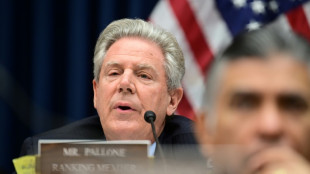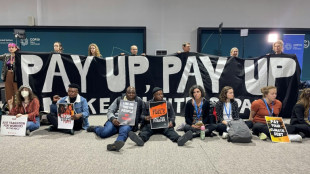
-
 Macron tells Xi he shares desire for 'durable peace' in Ukraine
Macron tells Xi he shares desire for 'durable peace' in Ukraine
-
Ruthless Japan beat China to move to brink of World Cup qualification

-
 French farmers threaten 'chaos' over proposed EU-Mercosur deal
French farmers threaten 'chaos' over proposed EU-Mercosur deal
-
Brazil arrests G20 guards over alleged 2022 Lula assassination plot

-
 China's Xi urges 'strategic' ties in talks with Germany's Scholz
China's Xi urges 'strategic' ties in talks with Germany's Scholz
-
Raducanu gives Britain lead on Slovakia in BJK Cup semis

-
 Russia says Ukraine fired first US-long range missiles
Russia says Ukraine fired first US-long range missiles
-
COP29 negotiators strive for deal after G20 'marching orders'

-
 Walmart lifts full-year forecast after strong Q3
Walmart lifts full-year forecast after strong Q3
-
British farmers protest in London over inheritance tax change

-
 NATO holds large Arctic exercises in Russia's backyard
NATO holds large Arctic exercises in Russia's backyard
-
Trouble brews in India's Manipur state

-
 Son of Norwegian princess arrested on suspicion of rape
Son of Norwegian princess arrested on suspicion of rape
-
Romanian court says 'irregularities' in influencer Andrew Tate's indictment

-
 Iran faces fresh censure over lack of cooperation at UN nuclear meeting
Iran faces fresh censure over lack of cooperation at UN nuclear meeting
-
Despondency and defiance as 45 Hong Kong campaigners jailed

-
 Scholar, lawmakers and journalist among Hong Kongers jailed
Scholar, lawmakers and journalist among Hong Kongers jailed
-
European stocks slide on fears of Russia-Ukraine escalation

-
 Police break up Georgia vote protest as president mounts court challenge
Police break up Georgia vote protest as president mounts court challenge
-
Spain royals visit flood epicentre after chaotic trip

-
 France's Gisele Pelicot says 'macho' society must change attitude on rape
France's Gisele Pelicot says 'macho' society must change attitude on rape
-
G20 leaders talk climate, wars -- and brace for Trump's return

-
 US lawmaker accuses Azerbaijan in near 'assault' at COP29
US lawmaker accuses Azerbaijan in near 'assault' at COP29
-
Tuchel's England have 'tools' to win World Cup, says Carsley

-
 Federer hails 'historic' Nadal ahead of imminent retirement
Federer hails 'historic' Nadal ahead of imminent retirement
-
Ukraine vows no surrender, Kremlin issues nuke threat on 1,000th day of war

-
 Novo Nordisk's obesity drug Wegovy goes on sale in China
Novo Nordisk's obesity drug Wegovy goes on sale in China
-
Spain royals to visit flood epicentre after chaotic trip: media

-
 French farmers step up protests against EU-Mercosur deal
French farmers step up protests against EU-Mercosur deal
-
Rose says Europe Ryder Cup stars play 'for the badge' not money

-
 Negotiators seek to break COP29 impasse after G20 'marching orders'
Negotiators seek to break COP29 impasse after G20 'marching orders'
-
Burst dike leaves Filipino farmers under water

-
 Markets rally after US bounce as Nvidia comes into focus
Markets rally after US bounce as Nvidia comes into focus
-
Crisis-hit Thyssenkrupp books another hefty annual loss

-
 US envoy in Lebanon for talks on halting Israel-Hezbollah war
US envoy in Lebanon for talks on halting Israel-Hezbollah war
-
India to send 5,000 extra troops to quell Manipur unrest

-
 Sex, drugs and gritty reality on Prague's underworld tours
Sex, drugs and gritty reality on Prague's underworld tours
-
Farmers descend on London to overturn inheritance tax change

-
 Clippers upset Warriors, Lillard saves Bucks
Clippers upset Warriors, Lillard saves Bucks
-
Acquitted 'Hong Kong 47' defendant sees freedom as responsibility

-
 Floods strike thousands of houses in northern Philippines
Floods strike thousands of houses in northern Philippines
-
Illegal farm fires fuel Indian capital's smog misery

-
 SpaceX set for Starship's next flight, Trump expected to attend
SpaceX set for Starship's next flight, Trump expected to attend
-
Texans cruise as Cowboys crisis deepens

-
 Do the Donald! Trump dance takes US sport by storm
Do the Donald! Trump dance takes US sport by storm
-
Home hero Cameron Smith desperate for first win of 2024 at Australian PGA

-
 Team Trump assails Biden decision on missiles for Ukraine
Team Trump assails Biden decision on missiles for Ukraine
-
Hong Kong court jails 45 democracy campaigners on subversion charges

-
 Several children injured in car crash at central China school
Several children injured in car crash at central China school
-
Urban mosquito sparks malaria surge in East Africa


China pushes smaller, smarter loans to Africa to shield from risks
China's years of splashing cash on big-ticket infrastructure projects in Africa may be over, analysts say, with Beijing seeking to shield itself from risky, indebted partners on the continent as it grapples with a slowing economy at home.
Beijing for years dished out billions in loans for trains, roads and bridges in Africa that saddled participating governments with debts they often struggled to pay back.
But experts say it is now opting for smaller loans to fund more modest development projects.
"China has adjusted its lending strategy in Africa to take China's own domestic economic troubles and Africa's debt problems into account," Lucas Engel, a data analyst studying Chinese development finance at the Boston University Global Development Policy Center, said.
"This new prudence and risk aversion among Chinese lenders is intended to ensure that China can continue to engage with Africa in a more resilient and sustainable manner," he told AFP.
"The large infrastructure loans China was known for in the past have become rarer."
As African leaders gathered this week for Beijing's biggest summit since the pandemic, President Xi Jinping committed more than $50 billion in financing over the next three years.
More than half of that would be in credit, Xi said, while the rest would come from unspecified "various types of assistance" and $10 billion through encouraging Chinese firms to invest.
Xi gave no details on how those funds would be dished out.
- Loans redirected -
China has for years pumped vast sums of cash into African nations as it looks to shore up access to crucial resources, while also using its influence as a geopolitical tool amid ongoing tensions with the West.
But while Beijing lauds its largesse towards the continent, data shows China's funding has dwindled dramatically in recent years.
Chinese lenders supplied a total of $4.6 billion to eight African countries and two regional financial institutions last year, according to Boston University research.
The key shift concerns those on the receiving end: more than half of the total amount went to multilateral or nationally owned banks -- compared with just five percent between 2000 and 2022.
And although last year's loans to Africa were the highest since 2019, they were less than a quarter of what was dished out at the peak of nearly $29 billion eight years ago.
"Redirecting loans to African multilateral borrowers allows Chinese lenders to engage with entities with high credit ratings, not struggling individual sovereign borrowers," Engel said.
"These loans reach private borrowers in ailing African countries in which African multilateral banks operate."
- Modest approach -
China coordinates much of its overseas lending under the Belt and Road Initiative (BRI), the massive infrastructure project that is a central pillar of Xi's bid to expand his country's clout overseas.
The BRI made headlines for backing big-ticket projects in Africa with opaque funding and questionable impacts.
But China has been shifting its approach in the past few years, analysts said.
It has increasingly funnelled money into smaller projects, from a modestly sized solar farm in Burkina Faso to a hydropower project in Madagascar and broadband infrastructure in Angola, according to Boston University's researchers.
"The increased volume of loans signals Africa's continued importance to China, but the type of loans being deployed are intended to let Africans know that China is taking African concerns into account," Engel told AFP.
This does not mean that Beijing is "permanently retrenching its investments and provision of development finance to the continent", Zainab Usman, director of the Africa Program at the US-based Carnegie Endowment for International Peace said.
"Development finance flows, especially lending, (are) now starting to rebound," she said.
- No 'debt traps' -
African leaders have this week secured deals with China on a range of sectors including infrastructure, agriculture, mining and energy.
Western critics accuse China of using the BRI to enmesh developing nations in unsustainable debt to exert diplomatic leverage over them or even seize their assets.
A chorus of African leaders -- as well as research by leading global think tanks like London's Chatham House -- have rebuked the "debt trap" theory.
"I don't necessarily buy in the notion that when China invests, it is with an intention of... ensuring that those countries end up in a debt trap," South African President Cyril Ramaphosa said in Beijing on Thursday.
One analyst agreed, saying that for many Africans, China has "become synonymous" with life-changing roads, bridges and ports and the debt-trap argument ignores the "positive impact" Beijing has had on infrastructure development on the continent.
"The reality is some (African) countries have had a tough time fulfilling their debt repayment commitments due to a multiplicity of factors," Ovigwe Eguegu, a policy analyst at consultancy Development Reimagined, said.
Engel, of the Boston University research centre, said the argument mistakenly assumes that "China solely has short-term objectives in Africa".
That, he said, "vastly underestimates (its) long-term vision... to shape a system of global governance that will be favourable to its rise".
D.Lopez--AT
